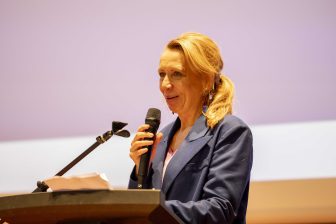
Share best practice at Child in the City Brussels 2023
Our Child in the City World Conference 2023 will provide a valuable opportunity for child professionals to learn from each other about what can be done to better the lives of children in cities.
The closing date for submitting abstract proposals has now ended, and the Child in the City Foundation would like to thank all who sent in their proposals.
But even if you are not presenting at our flagship conference in Brussels, we would love for you to join us as a visitor at the event being held by the foundation in partnership with the Brussels Capital Region and Flemish Community Commission.
The focus of our three-day event, from November 20-22, will be on can all best work for the interests of children in cities everywhere. Building the Future is the theme chosen by our Scientific Program Committee (SPC) for 2023.
‘Share knowledge of best practice’
The CITC Foundation, through its interdisciplinary approach, is able to engage different disciplines and open up new and promising perspectives. This conference is a valuable opportunity for child professionals, city planners, academics, social workers, designers and policymakers to share knowledge of best practice and highlight new insights on how to build child-friendly urban futures.
Under the overarching theme of Building the Future, our flagship event will focus specifically on five key topics:
- Building on Creativity
Children’s creativity is an important tool to shape the future. On one hand we need to stimulate urban conditions that develop children’s skills to express themselves in creative ways. Artists, museums and schools have a big responsibility to ensure cultural education for children and youth. And on the other hand, we want to apply children’s creative capital to develop innovative solutions for the many problems society is facing today. How can we ensure that the creativity within young people is both developed and translated towards the shaping of a better future?
- Building on intergenerational cohesion
Many cities struggle with a lack of cohesion and lack of space. Socially, it is increasingly important to replace age-specific policies with policies that stimulate encounters between all age groups. The future child-friendly city should include teenagers and older people, not to mention grandparents. Spatially, there is an urge to serve different age groups one at a time. In today’s context of ever-growing city densities, it is necessary to focus on intergenerational spaces. How can social and spatial interventions facilitate intergenerational contact and social cohesion?
- Building on (international) solidarity
Current times are hard times for many children growing up in Europe and further afield, with migration creating a huge flow of families and children across the globe. We must all work to overcome the difficulties with integrating newly-arrived citizens. What does it mean for children to grow up in disadvantaged neighbourhoods and how can we improve their living conditions? How do we build on international solidarity that also supports children growing up in other parts of the world where they struggle with war, natural disasters and hunger?
- Building on participation and democracy
In this 11th version of the Child in the City World Conference we are particularly keen that children’s voices should be heard. That includes much more than ‘simple’ youth participation. How can we educate children towards becoming responsible members of democratic societies? This topic is about young people’s citizenship, and so it is particularly fitting that we are meeting in the European capital, Brussels. What can European citizenship bring to young people, and what can bring young people themselves to Europe?
- Building on young people-friendly urban space
Outdoor play and opportunities for children’s freedom of movement are still falling. That should not be the case. It is a big challenge in urban planning to make urban space accessible to the youngest citizens in sustainable ways. What good examples do we see of green urban spaces, safe bicycle lanes, attractive playgrounds, smart school yards, and well-designed childcare facilities that really support children’s development and young people’s freedom of movement?
If you’d like to attend this important event then you can register for updates at our dedicated website at https://events.childinthecity.org/ or you can email Manouk Brouwers, Event Manager, at manouk.brouwers@promedia.nl
All of the submitted abstracts are being reviewed by our Scientific Program Committee, and updates will be provided on submissions no later than 23 June. You can also send any questions to rob.vos@childinthecity.org




